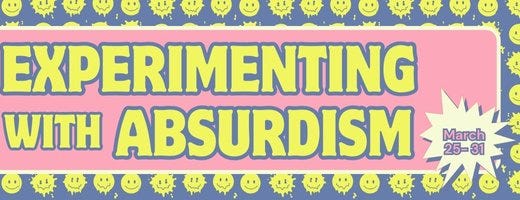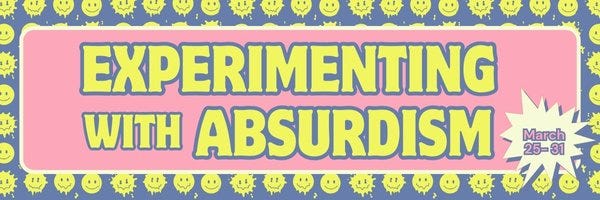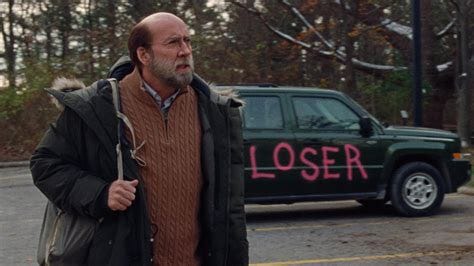Quick reminder - if you’re a paid subscriber you get access to our monthly Rabbitholes and Reflections workshop where we look back on the past month and set goals for the next. Our next workshop is Friday March 29th, and this is your final week of March, so get yourself in the mood to accomplish at least one of your priorities. You’ll feel so much better on Friday if you do.
For access to the workshop, upgrade and scroll to the bottom!
We’re in the process of recognizing the Absurd, and I’ve found another example for you in an excellent film by Kristoffer Borgli.
In Dream Scenario, a professor of evolutionary biology, Paul (Nick Cage), starts appearing in people’s dreams around the world. I didn’t realize what this movie was about until late in the movie, but Paul is creating his own reality. It’s a perfect reflection of the Absurd. In the beginning, he is about to confront an old colleague whom he accused of stealing his ideas. He coined the term “Ant-elligence” to describe the collective intelligence of insects like ants. Paul’s wife hypes him up to confront her and when he does he lets her steamroll him. Paul tells his colleague he is writing a book about what she stole from him, but he hasn’t even started it. He’s done nothing except dream about his ideas yet he wants recognition. She says, “There’s a big difference between talking about an idea and doing the work,” and he knows she’s right.
This opening scene is representative of Paul’s entire life. The film opens with his daughter explaining a dream in which she floats away and he does nothing. He argues with her that he really isn’t like that in real life, but she’s had the same dream over and over. He goes through his day expecting recognition from his colleagues and students, for doing nothing, and somehow he gets recognition from random people for doing nothing. When he asks people what he’s doing in the dreams, they all say… nothing. He can’t even own up to what he really desires (recognition) or what he needs to do to get what he really wants, and when he starts getting what he wants, he can’t see that he’s somehow creating his own reality.
He decides he’s going to use his fame to get a book deal, and lo and behold, with his new notoriety an agent (Michael Cera, excellent) flies him to New York to sign him for promotional gigs, one of which is a cringe deal with Sprite. He hates the idea and just wants to write the book, but he sells out, to negotiate the book deal. One of the girls at the agency tells him that she dreamt of him, and he was actually doing something in her dream. She persuades him to come to her apartment and re-enact her kinky dream where he grabs her by the throat, and of course, he completely fucks it up - not hot at all. He’s trying to be something he is not.
When he returns home, his students have been dreaming of him again, but this time, Paul is something he is not - a murderer - choking and strangling people. The only person who isn’t dreaming about him is his own wife - who already recognizes him. His daughter tells him a classmate dreamt that her dad cut off and ate his toes. Finally he as a dream where he is being hunted by himself and is finally shot in the throat. He then issues a maniacal apology where he claims he is a victim (metaphorically shooting himself in the throat again). Everyone wants him to own the dreams, but he refuses.
I won’t spoil the rest (it’s so good), but I will give you a little science and philosophy to infuse into this cultural gem…
The Science
Should Paul have taken responsibility for murdering people? Is there scientific evidence to suggest that he could have been responsible?
Not really, but a lack of evidence doesn’t rule something out. The dreams start slow: his daughter and his ex-girlfriend, then a friend of a friend, his students, and then people all over that he doesn’t know. Richard Dawkins’ concept of the meme could apply here, where units of culture replicate and mutate throughout society - and he even mentions this in class - but the phenomenon was happening widely enough to draw attention in the first place. In the movie, the phenomenon is eventually studied and controlled. Just because there’s no science now, doesn’t mean there won’t be later. All science starts as conjecture - without evidence. Science is about making observations, and Paul was not a very good scientist.
This film also portrays an interesting depiction of Carl Jung’s concept of the collective unconscious, but is this science? Most people would say no, but our entire concept of science is changing. Paul didn’t realize this.
In all fairness, I feel for Paul… imagine people are dreaming about you and somehow it could be your fault? Logically, I’d have a hard time accepting this, but self-analysis and openness are key. Empirically, I see my behaviors reflected in the world, often through my own child, and Paul’s daughter was the first place he heard about the dreams. We have to be accountable for how we show up in the world, and to a certain extent how people perceive us - especially people we love.
Is this science? Not really in the standard definition of science, but we are talking about empirical observations. If we don’t properly observe what’s going on, well… we may lose everything we thought we had to begin with and our own dreams may haunt us as nightmares in our real lives. When there’s no data, all we can do is accept the absurd and embrace our radical freedom to live life however you want!
Don’t be like Paul!
The Philosophy
This film seems quite the opposite of Poor Things, in terms of it’s relation to the Absurd. In Poor Things, Bella accepts her absurd circumstances, embraces her freedom, and grows into her divine humanity. Whereas Paul shrinks from the truth and shrivels into a husk.
Paul is a stifled creator. He had so much potential to make things, but he chose to dwell in bitterness and idleness. Nietzsche had much to say about this in Thus Spake Zarathustra:
Creating —that is the salvation from suffering, and life’s allievation. But for the creator to appear, suffering itself is needed and much transformation.
Paul chose the simplest path. The easiest path that appeared before him.
Be on thy guard, also, against holy simplicity! All is unholy to it that is not simple…
And be on thy guard, also, against the assaults of thy love! Too readily doth the recluse reach his hand to any one who meeteth him.
To many a one mayest thou not give thy hand, but only thy paw; and I wish thy paw also to have claws.
But the worst enemy thou canst meet, wilt thou thyself always be; thou waylayest thyself in caverns and forests.
Thou lonesome one, thou goest the way to thyself! And past thyself and thy seven devils leadeth thy way!
A heretic wilt thou be to thyself, and a wizard and a sooth-sayer, and a fool, and a doubter, and a reprobate, and a villain.
Ready must thou be to burn thyself in thine own flame; how couldst thou become new if thou have not first become ashes!
Thou lonesome one, thou goest the way of the creating one: a God wilt thou create for thyself out of thy seven devils!
Ya think Paul could have looked inward and seen that he needed to make a change? The seven devils are the bad things that manifest for him from not getting rid of the old Paul and stepping into his higher creating self.
There’s more to say about narcissism, our cultural transmission through modern media, and parasociality, but I think the most interesting thing is Paul’s desire and path to self-awareness (or lack thereof). His desires reflect a lot of human desires these days, and Hegel wrote about this as the Lord-Bondsman dialectic where the first step in our self-conscious awareness occurs when:
Our desires are reflected outside of ourselves, in external validation. Paul wants recognition.
We see ourselves in relation to a power dynamic. Paul wants to be the master of what people see in their dreams, but he becomes a slave to them.
Finally, we grow to see ourselves in another. I don’t think Paul actually achieves this, but it’s kind of open-ended… watch the movie
I’d love to hear if you agree in the comments!
Thought Experiment:
In what way are you not accepting control over your own life? There has to be some problem you can think of where you have more control than you think, but you refuse to bring your dream to reality. What immediate difficulty or pain are you avoiding? Play out your dream scenario and follow the same problem to its nightmare conclusion.
I’ll go first:
For me, it’s this book. If I really want this book to come to life, I’ve got to make it happen. Which is why I’m going to start querying again next week. I’ll come up with a plan to send out a certain number of queries, and I may attend a writer’s workshop here in Nashville. If by the 2nd half of the year, I’ve got nothing, I will consider self-publishing. I don’t want this thing haunting me forever.
The dream is that the book does so well that I can write another, and another. That I can continue writing, reading, and thinking about science, philosophy and culture.
The nightmare is that I never publish the book, and live the rest of my life with all this shit I want to write being written by someone who isn’t me. I can relate to Paul in that respect. I’ve got ideas and have already had them sniped out from under me enough times to know how terrible it feels - and how insufferable you become when you’re a bitter person who hasn’t executed properly on their goals.
Speaking of goals - don’t forget to schedule time to join the workshop at 11:30 AM CT Friday, March 29th, or at least print out the worksheet and schedule some time to do it:






